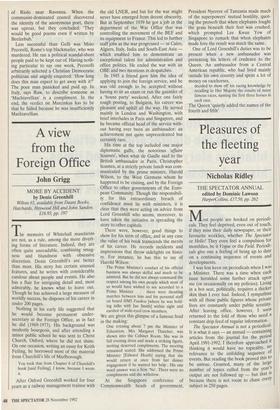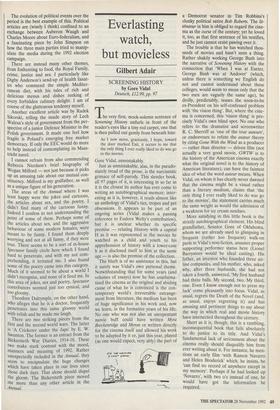Pleasures of the fleeting year
Nicholas Ridley
THE SPECTATOR ANNUAL edited by Dominic Lawson HarperCollins, 177.50, pp. 262 Most people are hooked on periodi- cals. They feel deprived, even out of touch, if they miss their daily newspaper, or their favourite weeklies, whether The Spectator or Hello! They even feel a compulsion for monthlies, be it Vogue or the Field. Periodi- cals give one a feeling of being up to date on a continuing sequence of events and developments.
I was less keen on periodicals when I was a Minister. There was a time when each issue heralded some further attack upon me (or occasionally on my policies). Living in a hot seat, politically, requires a thicker skin than I ever had. Indeed, I sympathise with all those public figures whose private lives are constantly under public scrutiny. After leaving office, however, I soon returned to the fold of those who need a constant drip feed of regular information.
The Spectator Annual is not a periodical. It is what it says — an annual — containing articles from the journal for the period i April 1991-1992. I therefore approached it thinking it would have no topicality, no relevance to the unfolding sequence of events. But reading the book proved this to be untrue. Granted, many of the large
number of topics culled from the years i output are not followed up — but that s because there is not room to chase every subject in 250 pages. The evolution of political events over the period is the best example of this. Political articles are (wisely I think) confined to an exchange between Auberon Waugh and Charles Moore about Euro-federalism, and a fascinating piece by John Simpson on how the three main parties tried to manip- ulate the media during the 1992 election campaign. There are instead many other themes, from foxhunting to food, the Royal Family, crime, justice and sex. I particularly like Digby Anderson's send-up of health fanat- ics who commend the simple Mediter- ranean diet, with his tales of rich and delicious menus and dishes reeking of every forbidden culinary delight. I am of course of the gluttonous tendency myself. Another excellent article was by Radek Sikorski, telling the • inside story of Lech Walesa's style of government from the per- spective of a junior Defence Minister in the Polish government. It made one feel how fragile is Poland's emerging free market democracy. If only the EEC would do more to help instead of contemplating its Maas- tricht navel.
I cannot refrain from also commending Rebecca Nicolson's brief biography of Wogan Milford — not just because it picks up an amusing tale about our mutual con- stituency. Milford is my godfather, as well as a unique figure of his generation. The areas of the Annual where I was least happy were the jokes and cartoons, the articles about sex, and the poetry. I didn't find many of the cartoons funny. Indeed I confess to not understanding the point of some of them. Perhaps some of the articles about sex, and the aggressive behaviour of some modern females, were meant to be funny. I found them deeply worrying and not at all funny, if they were true. There seems to be a sort of in-house Spectator family circle here which I found hard to penetrate, and with my not com- prehending, it irritated me. I also found some of the poetry came into this category. Much of it seemed to be about a world I didn't recognise, and none of it fired me. In this area of jokes, sex and poetry, Spectator contributors seemed just too cynical, and too gloomy. Theodore Dalrymple, on the other hand, who alleges that he is a doctor, frequently penetrates into this same gloomy world with relish and he made me laugh.
There are two striking pieces from the first and the second world wars. The latter is 'A Cricketer under the Japs' by E. W. Swanton. The former is an extract from the Bickersteth War Diaries, 1914-18. These two make stark contrast with the mood, manners and meaning of 1992. Rather unexpectedly included in the Annual, they seem to encapsulate the huge changes which have taken place in our lives since those dark days. That alone should dispel the gloom. The Bickersteth piece moved me more than any other article in the Annual.











































































 Previous page
Previous page